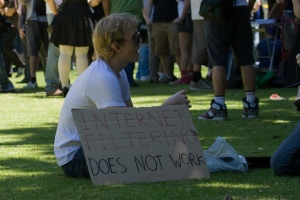How much protection is too much?
In schools today, the blocking of internet sites is extensive.
Similarly, most schools require that students surrender their mobile phones at the office before classes begin.
School policies will justify these choices by referring to student protection guidelines and citing the plethora of internet sites with malicious and harmful content. They may mention cyber bullying and identity theft. And they’ll likely conclude their diatribe with a maxim that sounds something like this: “We want them to learn! How on Earth will they do that if they’re constantly distracted by their phones?”
Cook, Pachler & Bachmair, 2011, have a different opinion of phones. They see them as new cultural resources. They also ask schools to “move educationally beyond protection from harmful content and beyond critical media literacy.” (p 192)
Traditional schooling practices prescribed a passive transfer of knowledge. Students came to school, teachers filled their heads with knowledge, they were tested on that knowledge, and if they could regurgitate it well, everyone celebrated a job well done.
Nowadays, however, the whole notion of learning has changed. Today’s learners, out of necessity, have to be at the centre of the learning process. (This concept is further explored here) Typical school “knowledge” is not deemed by them to be relevant to their lives, and is markedly different to the types of informal learning that youths are partaking in at home and with their friends. With easy access to a variety of devices that put the world at their fingertips, young people in recent times no longer need schools to “hack into” learning.
And thus enters the frustrated teacher. The one who knows that kids are experts with social media. The few educators who understand that the majority of learners in the classroom will know more about technology than their teachers. But who, when they try to harness this power and enable students to use these tools in their classrooms, get waylaid because of filters, ambushed by so-called safeguards that do more to highlight the ignorance and insecurities of educationalists than they do to support young learners. (Read about school censorship here)
Edmodo- a facebook of sorts, for the classroom. Blocked.
Youtube, with its multitude of informative content. Blocked.
Blogging sites. Where there is an authentic audience and purpose for writing. Blocked.
It’s naive of us to think that kids haven’t already perused the internet -uncensored- in the privacy of their bedrooms.https://ateacherislikeacandle.wordpress.com/2020/10/04/go-away-give-me-a-chance-to-miss-you-say-goodbye-itll-make-me-want-to-kiss-you/
It’s presumptuous of us to assume that more bullying will happen online than what already happens on the playground. And it’s downright idiotic of us to think that they don’t know how to turn off incoming calls and texts in order to focus on a limited number of applications. So, by allowing pupils to use technology… but within our carefully designed and outdated limits…. we candles are lighting the path…. and then forcing students to halt in their tracks when they hit darkness.
In other words, we’re teaching them to rely on us. And that we will make decisions- without consultation- for them.
And wouldn’t that make us candle carnivores- stifling the light of others?
Forgive me if it seems idealistic, but I thought our job was to empower kids to light their own candles from ours.
More than that, to consume ourselves, knowing that when all of our wax has waned, bright beams of light will sparkle because of us, forevermore.
⭐️⭐️⭐️⭐️⭐️⭐️⭐️⭐️⭐️⭐️⭐️⭐️⭐️⭐️⭐️⭐️
If you’d like to receive every new blog post straight into your email inbox each morning, click FOLLOW below 👇



Great post. I have a number of issues with internet filters not the least of them being that generally they don’t work. Filters need exact page URL’s to work, so unless you are aware of every single URL with ‘unacceptable’ material on it, generally you are going to miss quite a few websites. As you point out such filters give a false sense of security, implying that parents do not need to keep at least some tabs on what their kids are up to. It also absolves the parental responsibility to teach kids about what is acceptable, and to let them know if anything ever makes them feel uncomfortable.
Although I am not a teacher I can also relate to the idea that there is a good chance that students will be more tech savvy than teachers and parents, and will find an internet filter no issue to get around.
Obviously this leaves aside the arguments around how we decide what is to be blocked and what is acceptable and not involving young people in those decisions. A discussion perhaps for another day.
LikeLiked by 1 person
Outside boxes is the best kind 😉
LikeLiked by 1 person
I agree! Unless of course we want a world full of clones…
LikeLike
It seems such a shame to limit learning in this way when we live in such an interconnected society. Seems like children have access to the world and a kind of learning that doesn’t fit into little structured boxes if they are only given the opportunity.
LikeLiked by 1 person
A great point about limits and opportunities, overlanderfish. It seems as though trends in education swing like a pendulum- too much restriction becomes not enough. Let’s skip to the part where educators see potential before they see danger.
LikeLike